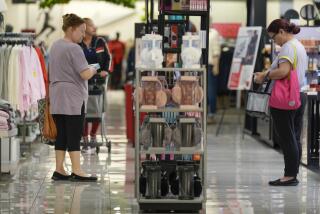Retailers get early start on the holidays
Temperatures are beachside-balmy. Most Americans haven’t thought about their Halloween costumes. Parents are still in back-to-school mode.
But retailers already have visions of profit dancing in their heads.
Kmart aired its first holiday ad last week, starring a gingerbread man touting the store’s layaway program. Wal-Mart and Toys R Us have publicized lists of their hot holiday toys.
This year, Christmas Creep goes turbo.
Retailers are starting the holiday season earlier than ever to lure elusive shoppers. The holiday shopping season accounts for roughly 20% of all annual retail activity, and last year’s was only lukewarm.
Since then, merchants have been bedeviled by waffling consumer confidence — a product of economic pressure from fleeting jobs, higher payroll taxes and expensive gasoline — and a persistent frugality inherited from the recession.
Janney Capital Markets analyst Adrienne Tennant wrote in a report Monday that September has been underwhelming for retailers so far, with a lack of newness in fashion apparel offerings likely to limit sales through the fall.
“We believe the back-to-school season has been below expectations and implies a weak holiday,” she predicted.
A report Tuesday from analytics firm ShopperTrak predicts that visits to stores will decrease 1.4% year over year this holiday season, although sales will rise 2.4%.
“Nobody can afford to procrastinate,” said Bill Martin, ShopperTrak’s founder.
This year, there are only 25 days between Christmas and Black Friday on Nov. 29 — the day when many retailers have historically used door-buster deals to kick off the holiday shopping season.
Last year, the period was 32 days long. There were five full weekends to buy presents, instead of the four weekends available this year.
ShopperTrak expects promotions to begin as early as the day after Halloween.
Sales at apparel and accessories stores in November and December will increase 2.8% from 2012, though traffic will slip 1%, according to the group. Electronics and appliance stores will enjoy a 2% sales bump while visitor counts will decrease 1.2%.
Retailers are hoping to boost those numbers by getting a head start on the season, which last year brought in $579.8 billion in revenue. Some 41.4% of shoppers last year said they planned to start their holiday shopping in October or earlier, compared with 38.9% in 2011, according to the National Retail Federation.
Importers were busy in July and August, bringing in 1.5% more cargo containers full of goods than in the same two months last year, according to Zepol Corp., a firm that tracks import and export data. The increase hints at a more active holiday shopping season to come, the company said.
Costco warehouses are already stocking Christmas decorations and artificial trees. The West Elm home decor chain has unveiled its holiday collection.
Kmart last week started promoting its free Christmas layaway program, available in stores and online with no minimum purchase requirement. A graphic on the company’s Facebook page urges fans to be “Kmart smart” by “setting your holiday budget in September … and sticking to it.”
The brand has a so-called Fab 15 list of top Christmas toys that include retro toys such as an exclusive auburn-haired Barbie and role-play items such as the Disney Sofia the First Transforming Dress & Trunk.
“You start to see different segments of shoppers shopping early,” said Jennifer Dominiquini, chief marketing officer of fitness, sporting goods and toys for Kmart’s parent Sears Holdings.
“There’s strong demand for the hot toys online already,” she said. “They’re always worried about scarcity.”
But some consumers resent the presence of Christmas advertising in September, echoing sentiments voiced last year when retailers began opening their doors to Black Friday shoppers while Thanksgiving dinner was still on the table.
“What happened to Halloween and Thanksgiving?” wrote Facebook user Crystal Salas-Dziadowicz on Kmart’s profile. “Stop with the Christmas commercials already!!”
Others cheered the reminder.
“I can get those items in high demand before others and before they sell out,” wrote user Cassandra George Terry. “This also benefits those who are unemployed like myself [and gives me] the time to get my four year old something and try to have a Christmas.”
Twitter: @tiffhsulatimes
More to Read
Inside the business of entertainment
The Wide Shot brings you news, analysis and insights on everything from streaming wars to production — and what it all means for the future.
You may occasionally receive promotional content from the Los Angeles Times.











